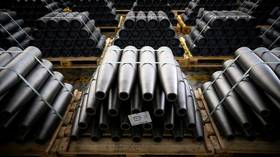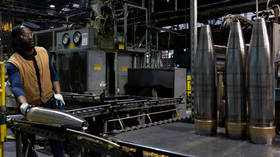West not prepared for conflict with China – FT

Ammunition shortages laid bare by the Ukraine conflict have prompted some US think-tanks to check on stockpiles in the West and find them wanting, the Financial Times reported on Wednesday. The military industry of NATO allies is not able to help, either.
A Center for Strategic and International Studies (CSIS) wargame of a conflict with China over Taiwan showed that the US had only about 450 long-range anti-ship missiles, enough for about a week.
Another think tank, the Center for New American Security (CNAS), said the existing missile inventory is “too small to blunt an initial invasion, let alone prevail in a protracted conflict against China.” To deter and defeat Beijing, the Pentagon “needs large stockpiles of stand-off missiles, maritime strike weapons, and layered air and missile defenses,” CNAS concluded.
According to the FT, the US Department of Defense has asked for $1.1 billion in the 2024 fiscal year to buy 118 long-range anti-ship missiles (LRASM), compared to half that amount for 83 missiles the year before. The Pentagon also wants $30 billion for ammunition, a 23% increase over 2023 levels, and $315 billion for new weapons.
CNAS has noted that the Pentagon tends to prioritize big-ticket items such as ships, planes and tanks, “leaving missiles and munitions with inadequate funding.”
The FT revealed that Western powers have spent a combined $170 billion on military and financial aid to Ukraine since February 2022. Kiev is still complaining about ammunition shortages, however.
The US military-industrial complex has spent decades prioritizing efficiency and adopting the just-in-time supply chain used by other industries, according to the FT, leaving it unable to scale up production in wartime. Parts and labor shortages are currently a problem as well.
“The defense industry is so consolidated that it can’t very quickly expand to support a greater demand,” said Stacie Pettyjohn of CNAS. “So we’re slow and behind and don’t have enough of anything.” Only five companies are responsible for major Pentagon contracts, and some parts are made by only one or two suppliers, with no way to make up the shortage elsewhere.
NATO allies are unable to step in and pick up the slack, because the US push to promote American-made weapons has left the European defense industry stunted and fractured, multiple think-tank experts told the FT.














